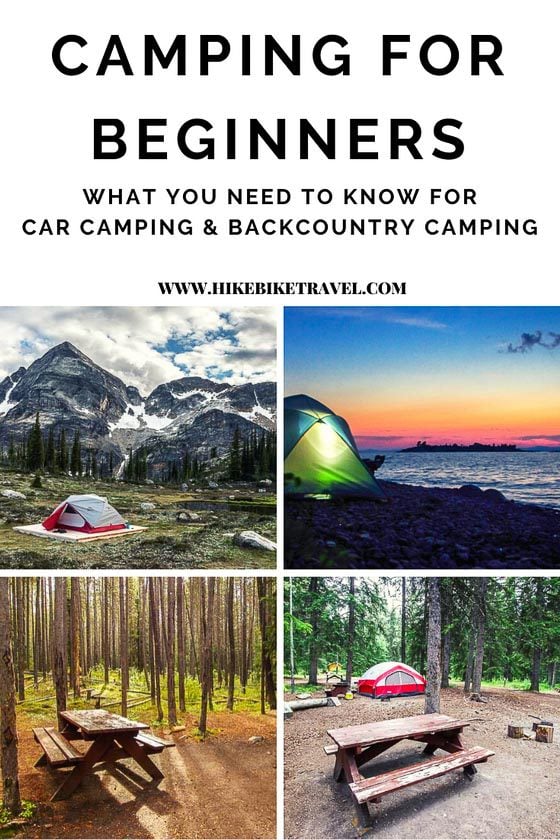I’ve been camping now for 30 plus years. Growing up it was all about cottages – but when John and I moved to Colorado, camping and hiking became our focus. We were broke and camping was cheap. All we needed was the initial investment in camping gear and a tank of gas every weekend and we could get ourselves into some fabulous Rocky Mountain scenery. We learned through trial and error what we needed – so this post on camping for beginners is for those of you that have spent very little time sleeping outdoors.
In this post you’ll find information on camping for beginners – broken down into car camping and backcountry camping.
You might like: 10 Beginner Backpacking Trips in the Canadian Rockies
This post includes some affiliate links. If you make a qualifying purchase through one of these links, I will receive a small percentage of the sale at no extra cost to you. Thank you very much for your support.
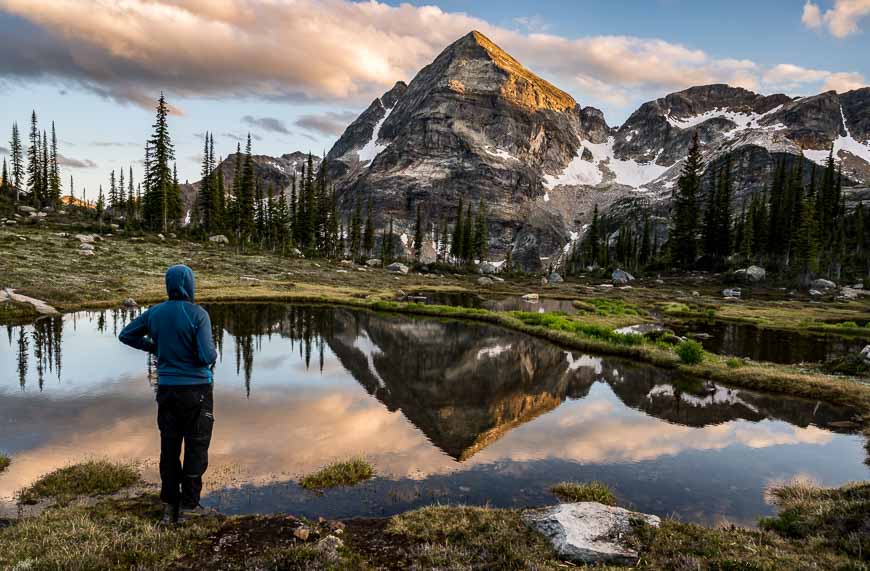
Car camping for beginners
Car camping is the easiest way to go camping. You can stuff your car to the gills without thinking too much about space.
But I wouldn’t recommend that as you’ll have a hard time finding what you need – and when you get home, it’s actually a lot of work to wash and put everything away.
You need a couple of things to start car camping – a tent, a method of cooking food, shelter in case of rain (think tarps), headlamps and/or lanterns for the evening, sleeping pads, and sleeping bags.
If you’re at a formal campsite with a picnic table then I’d also recommend a picnic table cover. You’ll need jugs of water, a cooler and food. Comfy camp chairs are a nice addition as are games to pass the time.
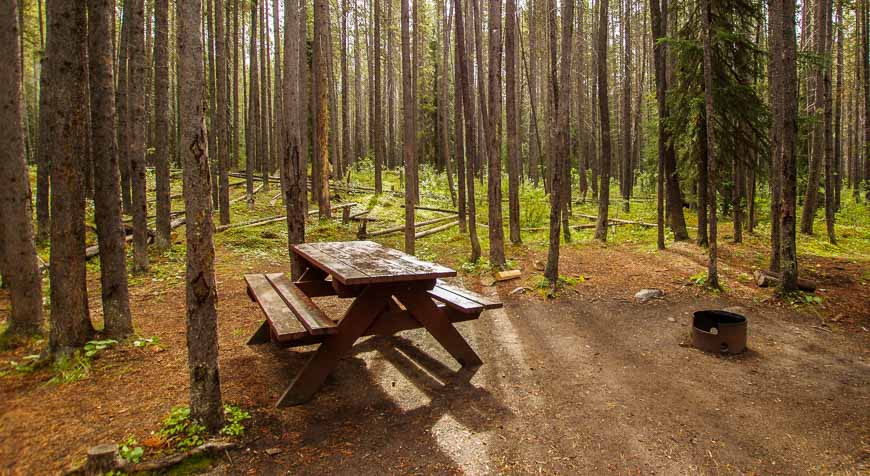
Camping for beginners: What kind of tent should you buy?
If you really think that car camping is going to be a once-off experience head to a place like Canadian Tire and pick up a tent to fit your budget.
I would recommend that you set up at home before you head out to make sure you have all the bits.
If you’re looking for a longer term purchase and only want one tent because you plan on backpacking too, then read my choice in the backpacking section below.
But if it’s all about car camping then comfort matters. You can buy a big tent without any thought to weight and you’ll be fine. Buy more space than you need in case you get a dog or you have kids or grandkids….
I still recommend looking for a tent with two doors in case someone has to get out to pee in the middle of the night. And I personally love tent pockets so I can stay organized. Check the zippers too and make sure they don’t catch easily. And the tent floor should be made of a durable material that doesn’t tear.
MEC has a great selection of car camping tents – backed by a solid guarantee. My friends swear by their Big Agnes tent and used it for years on the shores of Lake Superior. MEC Basecamper tent – for four people – rated 4.5 stars would also be a great choice.
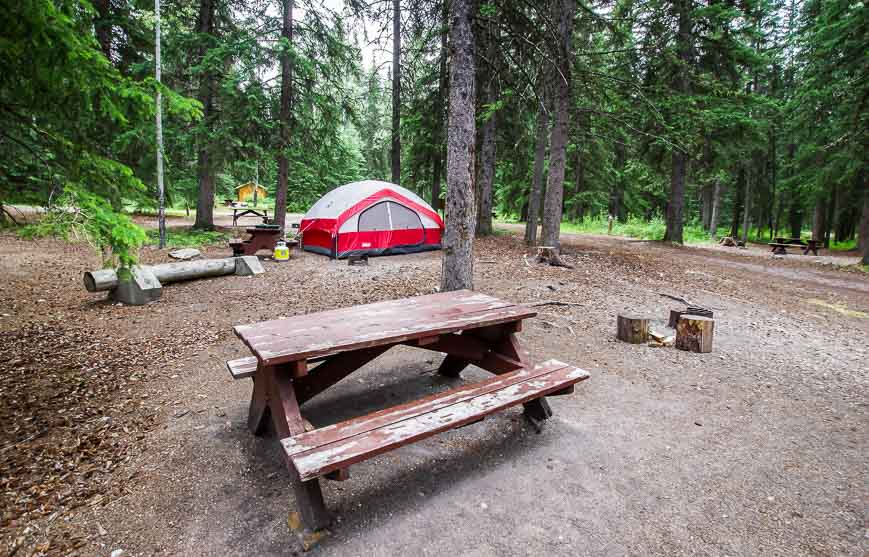
What you should know about sleeping bags
A sleeping bag is super personal. I hate mummy sleeping bags because I feel too confined. And I want one that is going to be warm on a frosty night in the mountains so I’m prepared to pay for that. You probably want to get into a sleeping bag before you purchase it.
And you’ll have to consider down versus synthetic bags. Consider the sleeping bag the biggest investment you’ll make! (I bought my latest sleeping bag from Feathered Friends in Seattle because of its weight. It cost a fortune but should last me till I die.)
The rest of the car camping gear you need
If price is the most important thing to you at this stage, head to a store like Canadian Tire in Canada. It’s definitely a good place to pick up tarps, ropes, fuel, a Coleman type two burner stove, lanterns, picnic table covers, coolers and giant water jugs.
If you’re only going to buy one sleeping pad I’d also go for quality especially if you’re planning to backpack. But if it’s all about car camping and comfort then bring a blow-up air mattress and luxuriate in the wild outdoors.
Car camping for beginners – essentials for a great experience
Stoves: A two burner stove like this would be a great choice. You won’t want to be confined to one burner! Don’t forget to take matches and a lighter or long lighter.
Pots and pans: I’d recommend the MSR 2 pot set (I’ve had mine for years!!!) along with a frying pan.
Cookware: You could bring cutlery from home but you might not want to lose it. This kitchen cookware set with a cutting board, spatula, spoon, grater, utensils and more looks ideal.
Mugs: Don’t forget a mug. If it’s going to be frosty get one with a lid.
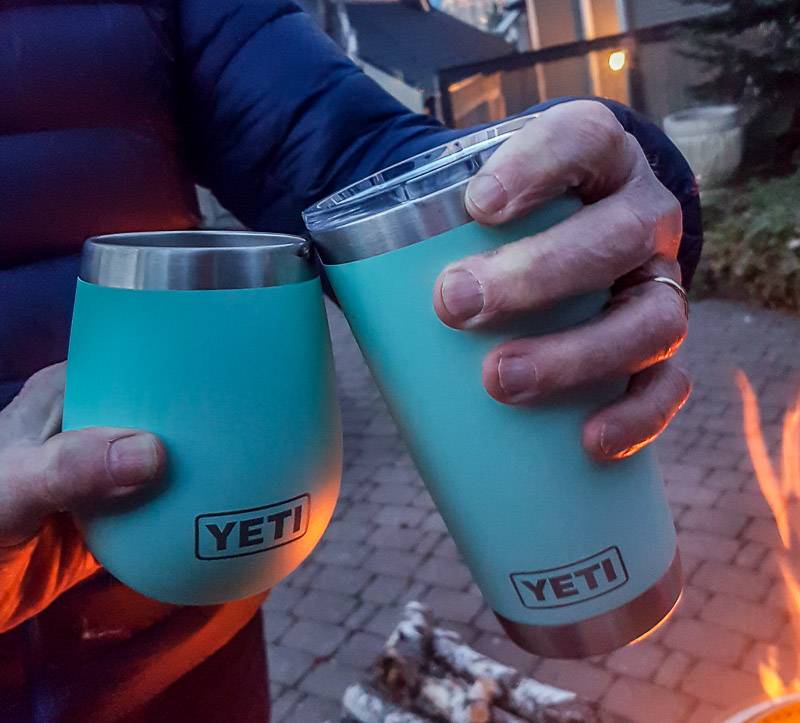
Bowls/plates: I like having a bowl and a plate but that will be a personal preference. There are lots of collapsible ones out there and maybe they’re great but I always worry about them collapsing when there is something hot in them. A simple plate and bowl is all you need – perhaps different colours for different people.
Tarps: I have lots of the cheap blue tarps that work well to keep you dry – though you need something to tie them off to – and you better not forget the rope! If you want to stay dry and bug free this a big tarp will do the trick.
Chairs for a comfort: For a camp chair my personal preference is one with a drink holder. They sure come in a variety of price points but beware – sometimes you get what you pay for.
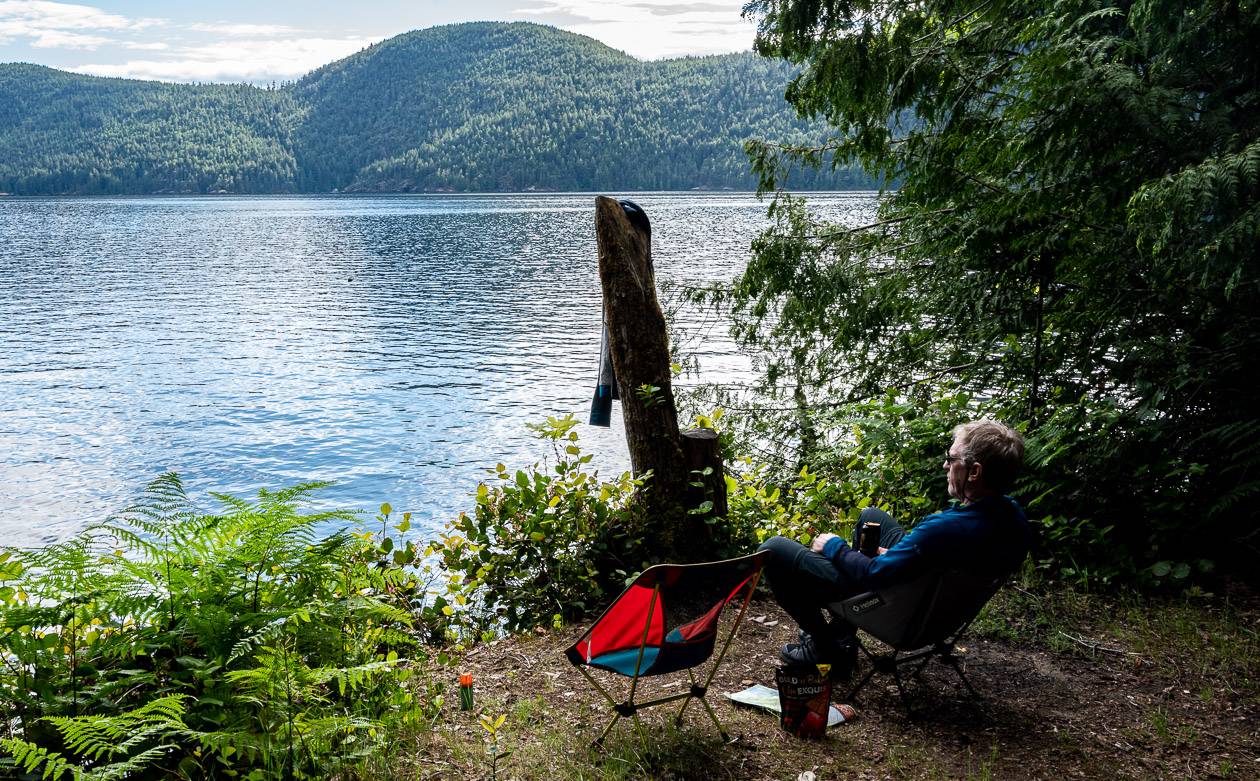
Lighting: You’ll probably want a camp lantern, especially if you roll into a campsite in the dark and have to set up your tent. I had no idea there were so many out there!
Headlamp: A must for everyone. Consider how you’re going to use it and how bright it needs to be. It can literally be a lifesaver out in the wilderness. I like this one by Petzl.
Sleeping pads: Thermarest sleeping pads or camping cots come in a huge range of choices.
First aid kit: You can put together your own first aid kit but be sure to have some of the basics in it. If you don’t want the hassle, a version of this first aid kit depending on how remote you are, would be good.
Coolers: If you want the best of the best that comes with a price tag to match, get a YETI cooler. It will keep your wine cold for almost a week – no lie. I have one that will last me a lifetime and I love it.
Water containers: You can fill these inexpensive water tanks at home for use at the campsite.
Bears: Take a couple of cans of bear spray with you and keep them handy.
Insects: Don’t forget bug repellent with Deet if you know they’ll be bad. And if you’re heading into bad bug country take a bug jacket like this one.
Camp shoes: A pair of flip flops come in surprisingly handy.
Extras: For a fun addition I think an old fashioned popcorn maker would be great.
Plastic containers: Buy a couple of clear plastic containers to organize your gear and your food. It will also help to keep critters out.
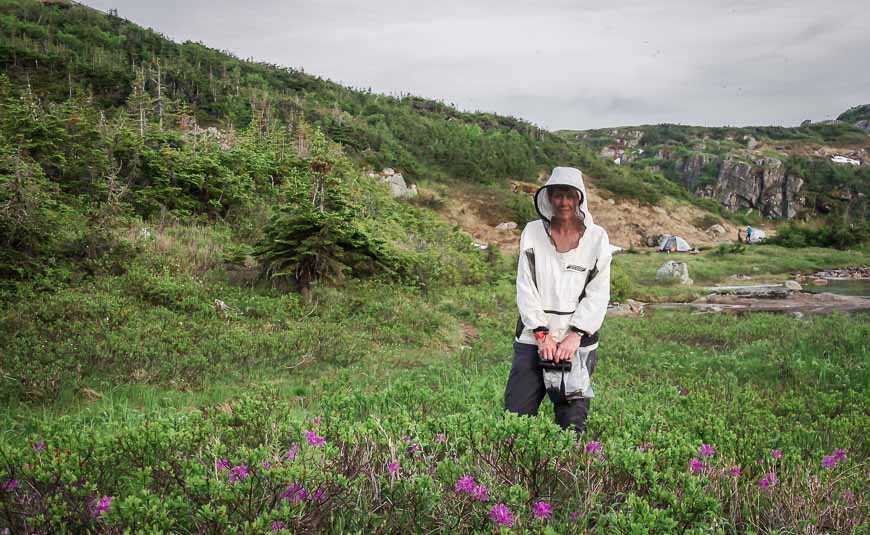
Backcountry camping for beginners
Backcountry camping is a whole other ‘kettle of fish.” You’ll be hiking, biking or paddling in all likelihood to get into the backcountry so weight can make or break your camping experience.
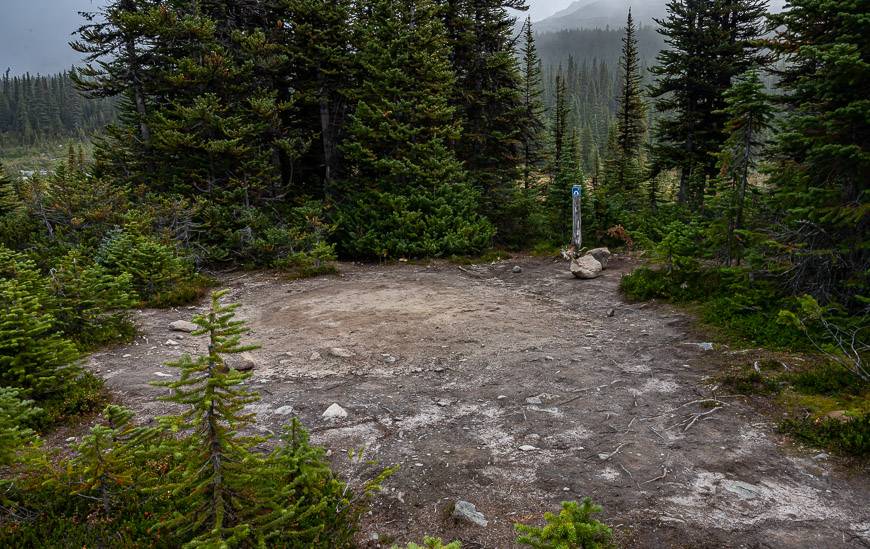
Camping for beginners – Backpacks for the backcountry
With everything you need in your backpack, you have to consciously pack for safety and enjoyment. To start, buy a backpack that is properly fitted to your frame. The kind of trips you plan to take will dictate how big it needs to be.
For my multi-day hikes I like a 70 L backpack. There are loads of good packs on the market including the Zephyr 65L backpack for woman. If at all possible try one out or make sure there is a good return policy. Also, make sure the bottom of the backpack has been reinforced.
I see some flimsy packs out there that won’t stand the test of even a short trip if they have to be dragged on rocks – like we did on the Coastal Trail in Pukaskwa. My friend Ted had to return his pack after getting holes in the bottom of it on the above-mentioned trip. My pack was fine.
Don’t forget a waterproof pack cover – and make sure it’s big enough.
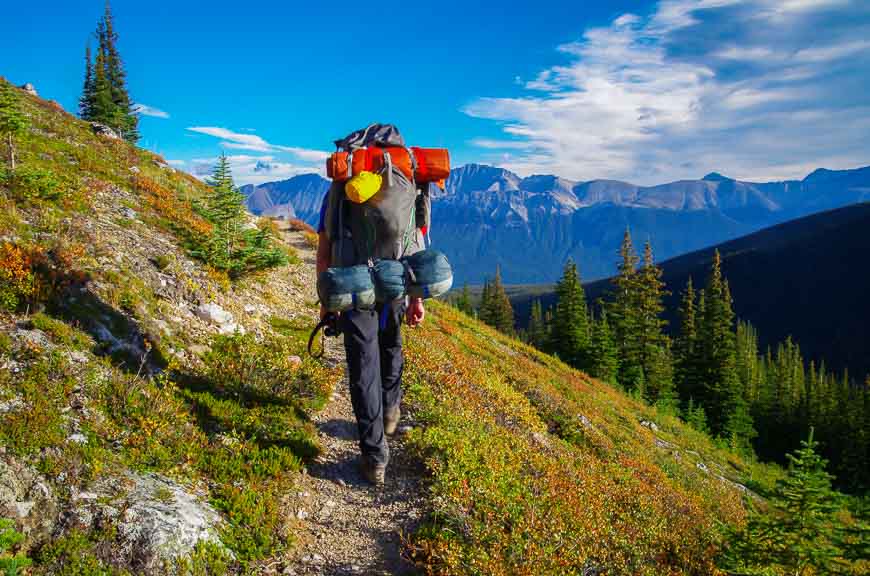
Many of the above mentioned items for car camping need to go with you backcountry camping. But there are some differences.
Backcountry camping for beginners – what tent to buy?
Tent weight doesn’t matter so much if you’re paddling but if you’re backpacking or cycling, it’s likely to be the heaviest piece of equipment you are carrying. Weight matters a lot in this case but so does comfort especially if you end up with days of rain.
Last year we bought a new tent. We literally put up five tents at MEC, and then crawled in to see what we thought of them. Our choice was the MSR Elixir 3. It went to Patagonia with us and withstood the ferocious wind. It’s still not as light as some but it’s way more durable. You will have to make that call.
I also tried the lighter MEC Spark 2-person tent. I think it’s a great choice when weight really does matter.
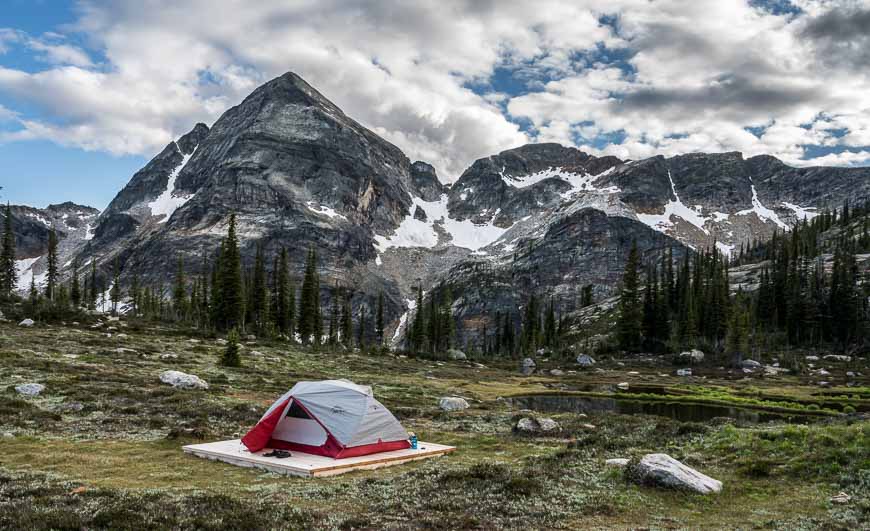
What you need to know about camping stoves
There are some very lightweight camp stoves on the market now – and if you’re simply boiling water they’ll do the trick quite nicely.
Don’t forget to factor in fuel you’ll have to carry though some are now woodburning.
I’d suggest carrying some fire starter if that’s the case especially if you’re dealing with wet wood.
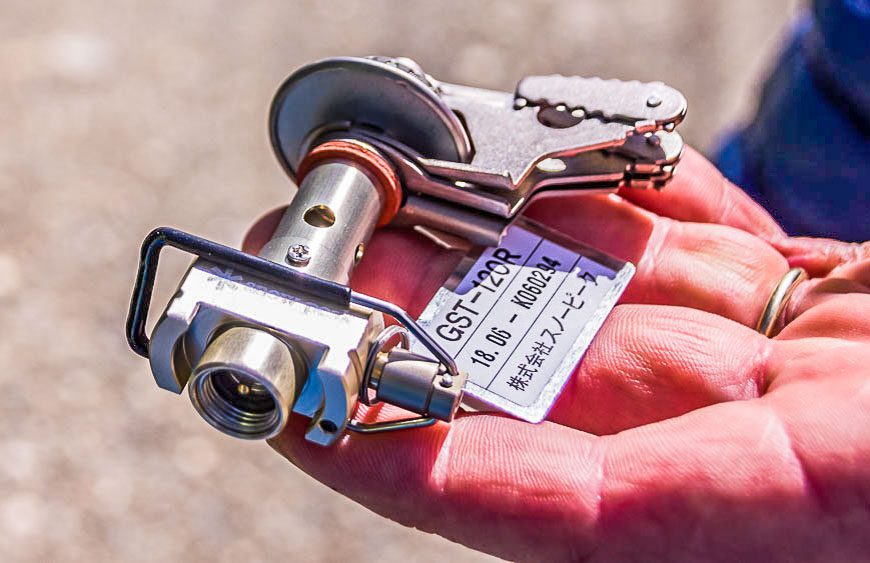
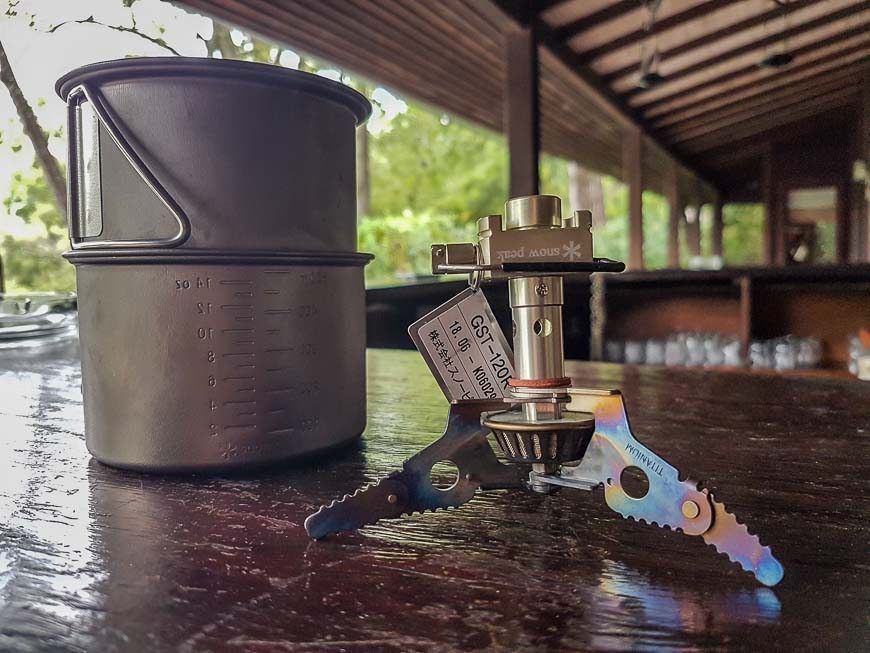
Camping for beginners – backcountry gear you’ll need
Water purification: You’ll also need a water filter. I particularly like the functionality and weight of the SteriPen. But there are water purification tablets and lots of water filters that would do the trick.
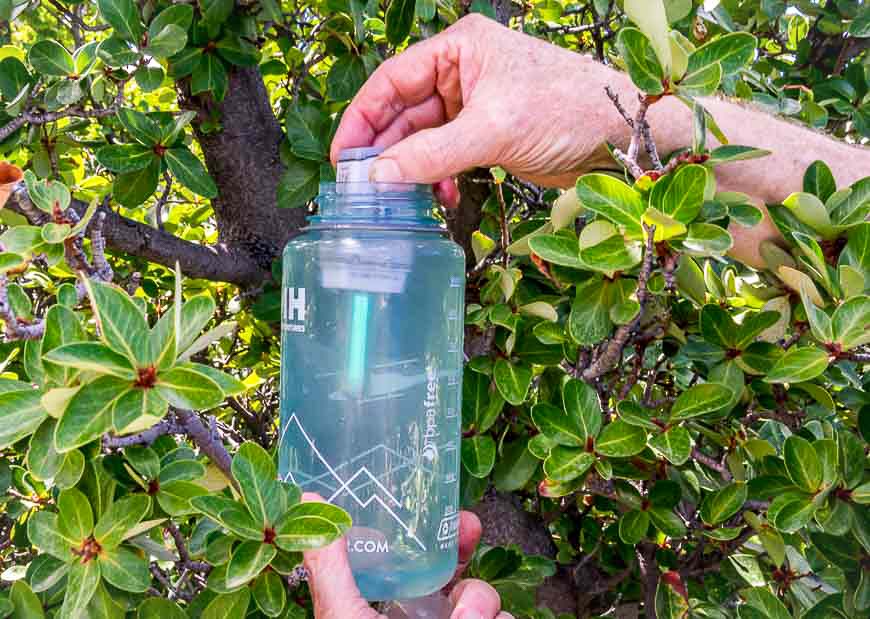
Navigation: Don’t forget a compass or GPS – and a good old-fashioned paper map. To be safe in an emergency, buy a Garmin InReach Mini and get it all set up.
Lightweight cooking gear: Keep your cooking gear light – perhaps with the help of a titanium pot set.
Bulk: When it comes to sleeping bags beware of those that are too bulky. Aim for something warm and lightweight. Use a compression sack to make it even smaller.
Gear for hanging food: At some campsites you’re going to have to hang all your food. Always take at least a couple of carabiners and one large durable sack for food – waterproof if at all possible.
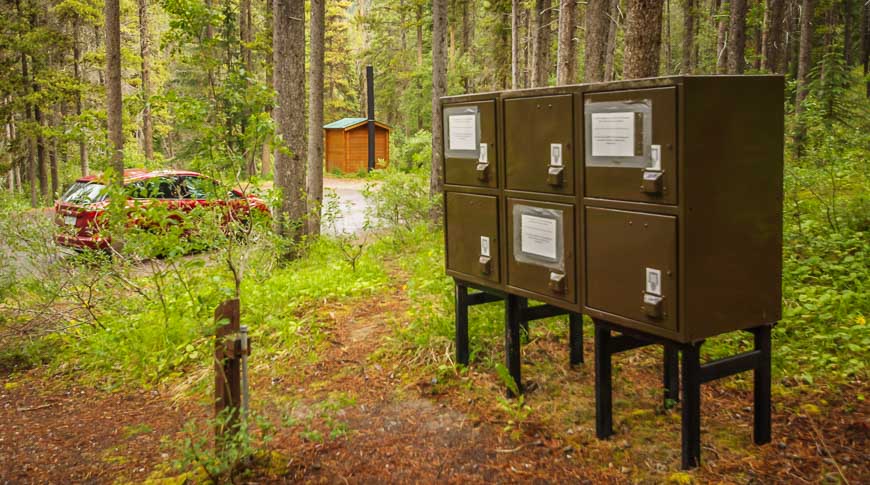
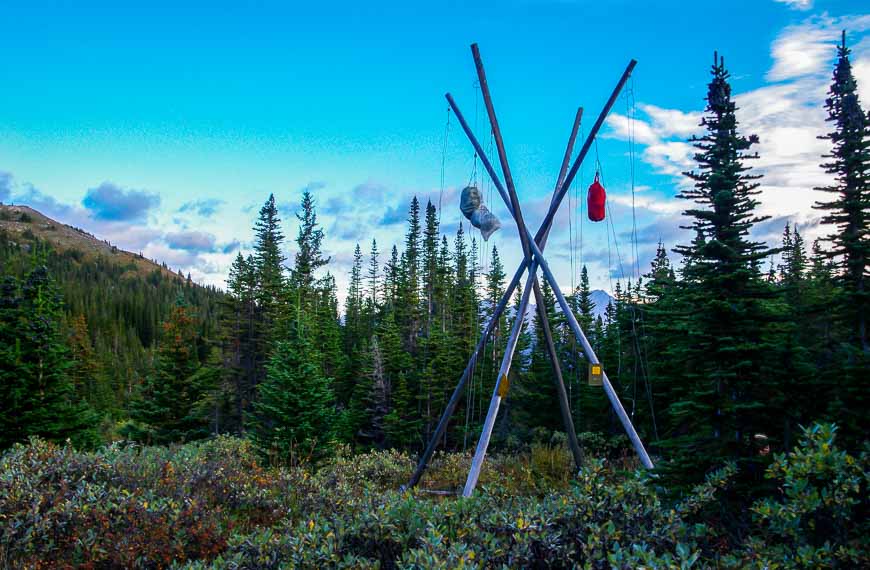
Schnerp – a website that will help you with finding cancelled camping reservations.
If you’re going into remote backcountry – even in Banff or Jasper National Parks, you don’t always need a reservation. You just have to follow the Leave No Trace principles. You might want to read How to Shit in the Woods – if you’re new to camping.
I would also recommend that you spend time on the internet scouring posts on how to find free campsites. A good example is this post by Offtrack Travel – The Complete Guide to Finding Free Camping in Canada.
I’m fussy about my campsites and prefer privacy or partying with my neighbours. I have learned through experience that the harder the hike or the longer the paddle, the better the change of finding a truly amazing campsite without another soul around.
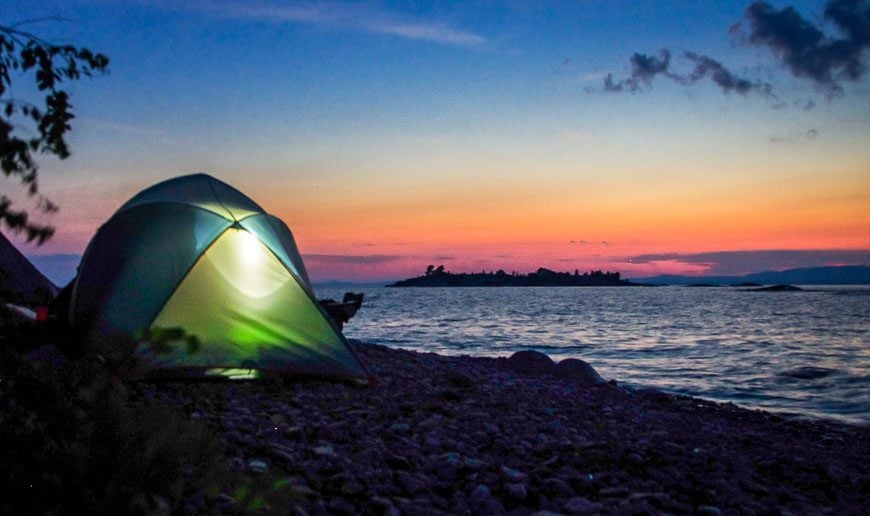
If you have questions about camping for beginners, shoot me an email and I’ll try to answer it.
Most of all have fun camping. I hope it becomes a lifelong love for you and your family. Even in the rain or when it’s buggy, I know I am in a far more relaxed state that I ever am at home.
Further reading on camping tips and places to go camping
- Everything You Need to Know About Camping on the Icefields Parkway
- Camping on Georgian Bay near Killarney Park
- A Complete Guide to Camping in Kananaskis
- 1000 Islands Camping – The oTENTik Way
- Camping in the Rain – Tips to Stay Warm and Dry
Click on the photos to bookmark to your Pinterest boards.
